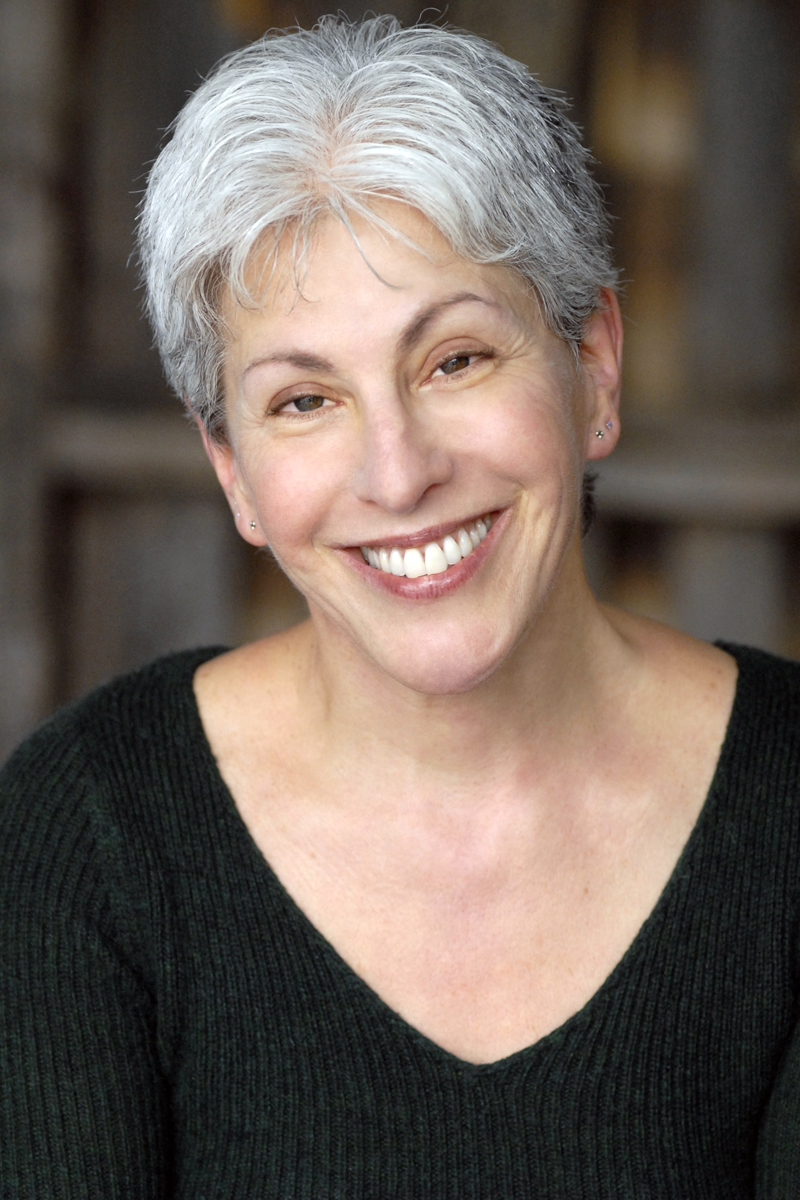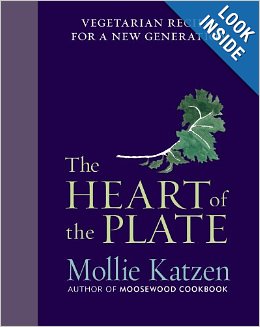Like millions of other home cooks, I have relied on Mollie Katzen as a muse and guide my whole adult life. Her Moosewood Cookbook, published in 1977, transformed vegetarian cooking forever, won a James Beard Hall of Fame Cookbook award, and was the very first cookbook I ever purchased. When my children were young, Honest Pretzels and Pretend Soup, with her beguiling illustrations and accessible recipes, inspired them to cook on their own. I often lend out her books to families I see in therapy who want to get their kids cooking.
Now comes Mollie Katzen’s 12th book, Heart of the Plate: Vegetarian Recipes for a New Generation (Rux Martin/Houghton Mifflin Harcourt). The recipes are appetizing to the eye and to the palate, thanks to her vibrant watercolor drawings and photographs that accompany the light and playful, recipes. She offers a new approach to vegetarian eating via building a meal in modules, and keeping components separate, like in a bento box. But Mollie Katzen doesn’t want to be put in a box when it comes to labeling her food. This cookbook is for anyone–vegetarian, vegan, omnivore, carnivore, likatarian (you just eat what you like)—who wants to enjoy eating more grains, nuts and vegetables.
In this Q and A, she shares her thoughts on her childhood family dinners, her dinners with her two children (now young adults), and gives some great tips to home cooks.
Childhood
Family Dinner Project: What was dinner like in your family when you were growing up?
Mollie Katzen: The food was very regimented per our busy family (four kids with various schedules, father working long hours, my mother in the traditional role of Meal Preparer). My mother sought convenience, and a typical meal was a good cut of meat taking up most of the plate, with frozen vegetable sides, iceberg lettuce salads with Russian dressing (first one I learned to make: half ketchup, half mayonnaise) and a “starch,” usually Minute Rice or baked potato.
Thursday nights were “dairy night” (kosher home) with kugels, rye bread, cheeses, frozen fish, cole slaw. Friday nights were special–home baked challah, appetizer (chopped egg with onion or half a grapefruit), roast beef, and dessert served in the dining room on a real tablecloth with cloth napkins and Concord grape “wine.” Saturday and Sunday nights were “breakfast for dinner.” I loved all of it!
The ambiance, however, was not as good as the food. My frisky brothers had trouble sitting still and fought a lot, and my parents were often stressed. I was required to serve and clean up (the only girl in a very patriarchal household) but didn’t actually mind, because I was fascinated with the food. I loved being close to its source, which walking back and forth to and from the kitchen allowed.
FDP: What were some of the influences that sparked your early interest in food?
MK: The weekly altered space and the prayers surrounding our Friday night dinners. My grandmother crafting handmade bread and pastries and chopped liver in our kitchen. The smell of onions frying—and other compelling aromas wafting from the kitchen. The traditional food of the Jewish holidays.
FDP: What is your first food memory?
MK: Mashed potatoes and gravy.
Family
FDP: What meal do your grown children want you to make when they come home to visit?
MK: My daughter: roasted vegetables and eggplant dips. My son: collaborative cooking, replete with shared menu planning and shopping. A joint project! The resulting meal can be anything.
FDP: What was their favorite meal as children?
MK: Homemade pizza.
FDP: Do you remember any kitchen disasters while making dinner for your children?
MK: No, but there were plenty during my own childhood, when I was learning to bake.
FDP: What impact did having a mother who was a cookbook writer have on your kids?
MK: The cooking part was all positive; they experienced first-hand the craft and love and variation of home-cooking, which they both completely adopted as their own. They were exposed to really good ethnic (Chinese, Indian, Thai, Greek) food, which was almost always what we chose when eating out. They are both super comfortable in any kitchen and adore fine dining, ethnic dining and good wine. The “well-known mother” was probably more complicated for them when they were young. I think they’re fine with it now.
FDP: What pantry items do you make sure that you never run out of?
MK: Olive oil, vinegars, onions, garlic, lemons, dried legumes (lentils, chick peas, black beans), wine.
Cookbook Writer
FDP: Where do you get your inspiration for new flavor combinations?
MK: Tradition, the occasional accident,and my own sense of taste logic.
FDP: Your drawings are such an integral part of the experience of reading your cookbook. How do they play a role in the creative process for coming up with new recipes?
MK: Yes – I storyboard things in notebooks, so it’s mostly all diagrammed before it’s tested and written.
FDP: What is the best part of writing a cookbook?
MK: The storyboarding and idea mapping. Envisioning, shopping, dreaming. Then, the illustrations.
FDP: What is the hardest part?
MK: Tying it together, making it “finite,” finished prose. Editing for technical accuracy and consistency.
FDP: Are there any food scenes from movies or novels that have inspired you?
MK: The eating scenes from “Babette’s Feast” and “Like Water for Chocolate”. The final scene of “Big Night”, when the two brothers share scrambled eggs in silence.
FDP: Foraged foods are a hot new trend in ethical eating. What do you think the next big trend will be?
MK: I have no idea, honestly. I am so out of it, trend-wise. Sorry! That said, I do think the next rock star vegetable, after Brussels sprouts and kale, will be (or already is) cauliflower.
Advice for Home Cooks
FDP: What advice can you give to home chefs to make cooking more fun?
MK: Choose just one or two recipes that appeal to you, to begin with, and adopt them as your own. Get really tight with them before branching out to more variety.
FDP: What advice do you have for families who are on a tight budget or using food stamps?
MK: Buy in bulk (club stores) and focus on dried legumes (such as lentils and beans as well as pasta, grains). Frozen vegetables in large quantities, if you have freezer space, are just fine. Befriend the produce person in your local grocery store, and become a regular customer for fruit and vegetable “seconds”—the blemished but not “gone bad” specimens that he/she might throw away because they are not cosmetically sellable. These will taste just fine and you can pay much less for them. As for drinks, make coffee and tea at home. Don’t buy them! You’ll saves thousands annually. And don’t buy beverages. Drink water.
FDP: I’ve heard you describe the dinner plate as a bento box, so that rather than trying to substitute a big vegetarian entrée for a meat dish, you suggest making several small modules. Could you tell us why you think this might work well for families who might have members with different tastes, or different levels of adventurousness?
MK: This module idea affords more “control” and ownership of each individual dinner plate. Autonomy is a big issue for fussy eaters, and the room to be creative with components helps people warm up to the unfamiliar.
FDP: Thank you so much, Mollie.
Try these two comfort food recipes from Mollie Katzen’s new book Heart of the Plate: Vegetarian Recipes for a New Generation: Curried Mashed Carrots and Cashews and Mushroom Popover Pie
 Mollie Katzen, with over six million books in print, is listed by the New York Times as one of the best-selling cookbook authors of all time. A 2007 inductee into the James Beard Cookbook Hall of Fame—and largely credited with moving plant-based cuisine from the fringe to the center of the American dinner plate—Katzen has been named by Health Magazine as one of The Five Women Who Changed the Way We Eat, and she has been a member of the faculty at Healthy Kitchens, Healthy Lives, the groundbreaking annual symposium co-hosted by The Culinary Institute of America and the Harvard School of Public Health, since its inception.
Mollie Katzen, with over six million books in print, is listed by the New York Times as one of the best-selling cookbook authors of all time. A 2007 inductee into the James Beard Cookbook Hall of Fame—and largely credited with moving plant-based cuisine from the fringe to the center of the American dinner plate—Katzen has been named by Health Magazine as one of The Five Women Who Changed the Way We Eat, and she has been a member of the faculty at Healthy Kitchens, Healthy Lives, the groundbreaking annual symposium co-hosted by The Culinary Institute of America and the Harvard School of Public Health, since its inception.
Mollie Katzen photo credit: : Lisa Keating

